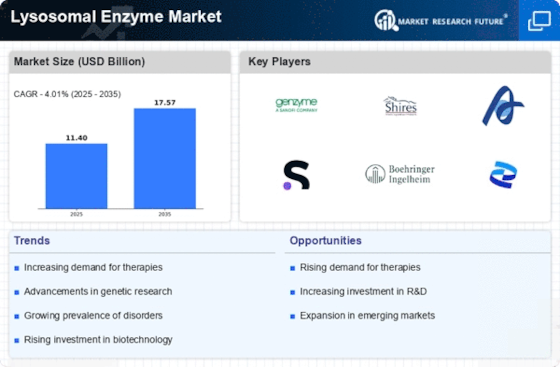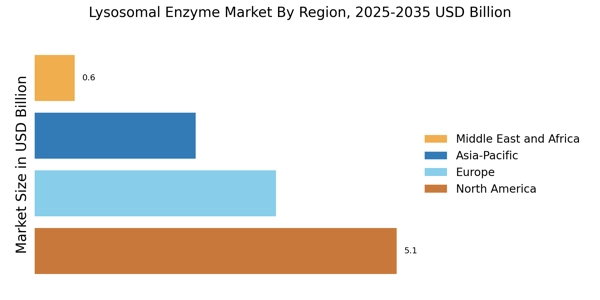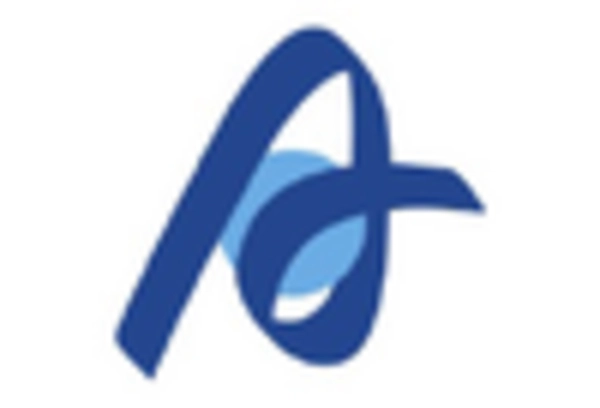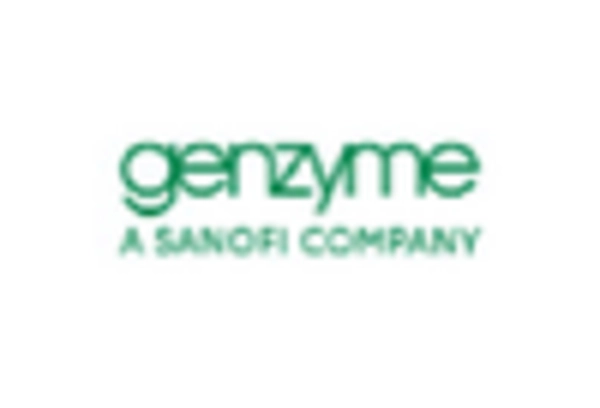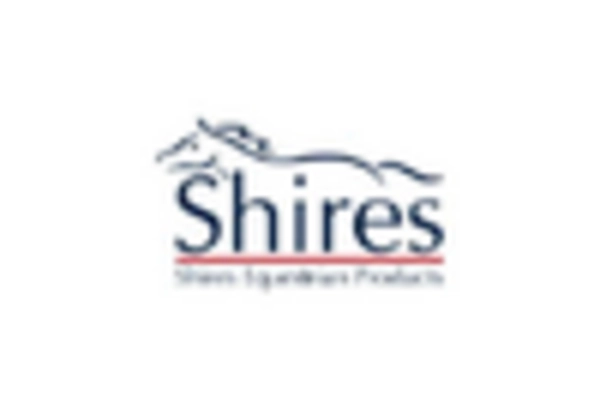Regulatory Support for Orphan Drugs
Regulatory frameworks supporting orphan drugs are significantly impacting the Lysosomal Enzyme Market. Many lysosomal enzyme therapies are classified as orphan drugs, which are designed to treat rare diseases. Regulatory agencies, such as the FDA and EMA, offer incentives for the development of these therapies, including tax credits, extended market exclusivity, and expedited review processes. Such support encourages pharmaceutical companies to invest in the development of lysosomal enzyme therapies, as the potential for profitability increases. The orphan drug designation not only facilitates faster access to the market but also enhances the likelihood of successful commercialization. As more companies pursue orphan drug status for their lysosomal enzyme products, the market is poised for substantial growth.
Growing Investment in Rare Disease Research
The surge in investment directed towards rare disease research is significantly influencing the Lysosomal Enzyme Market. Governments and private organizations are increasingly funding research initiatives aimed at understanding and treating lysosomal storage disorders. This financial support is crucial, as it fosters innovation and accelerates the development of new therapies. In recent years, funding for rare disease research has seen a substantial increase, with billions allocated to various projects. This influx of capital not only enhances research capabilities but also encourages collaboration among pharmaceutical companies, academic institutions, and research organizations. As a result, the market is likely to witness a rise in the number of approved lysosomal enzyme therapies, addressing the needs of patients with these rare conditions.
Technological Advancements in Enzyme Production
Technological innovations in the production of lysosomal enzymes are transforming the Lysosomal Enzyme Market. Advances in recombinant DNA technology and bioprocessing techniques have enhanced the efficiency and yield of enzyme production. For instance, the use of mammalian cell culture systems has improved the post-translational modifications of enzymes, resulting in more effective therapies. Furthermore, the development of novel purification methods has reduced production costs, making therapies more accessible. As these technologies continue to evolve, they are likely to facilitate the introduction of new enzyme therapies, thereby expanding the market. The integration of automation and artificial intelligence in production processes may also streamline operations, leading to increased output and reduced time to market.
Rising Prevalence of Lysosomal Storage Disorders
The increasing incidence of lysosomal storage disorders (LSDs) is a primary driver for the Lysosomal Enzyme Market. These rare genetic conditions, which include Fabry disease, Gaucher disease, and Pompe disease, are becoming more recognized, leading to heightened demand for enzyme replacement therapies. According to recent estimates, the prevalence of these disorders is approximately 1 in 5,000 live births, suggesting a significant patient population requiring treatment. As awareness grows, healthcare providers are more likely to diagnose these conditions earlier, further propelling the need for effective lysosomal enzyme therapies. This trend indicates a robust market potential for companies specializing in the development and distribution of lysosomal enzymes, as they seek to address the unmet medical needs of affected individuals.
Increasing Awareness and Advocacy for Rare Diseases
The growing awareness and advocacy for rare diseases are pivotal in shaping the Lysosomal Enzyme Market. Patient advocacy groups and non-profit organizations are playing a crucial role in raising awareness about lysosomal storage disorders, which has led to increased public and governmental attention. Campaigns aimed at educating healthcare professionals and the general public about these conditions are fostering earlier diagnoses and treatment initiation. This heightened awareness is likely to drive demand for lysosomal enzyme therapies, as more patients seek effective treatment options. Additionally, advocacy efforts are influencing policy changes that may improve access to therapies, further stimulating market growth. As awareness continues to expand, the market for lysosomal enzymes is expected to flourish.


